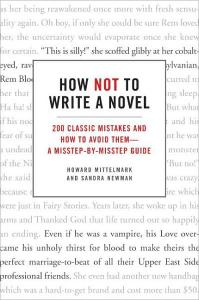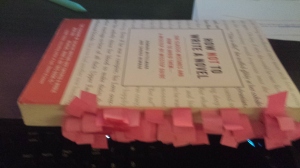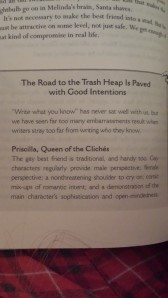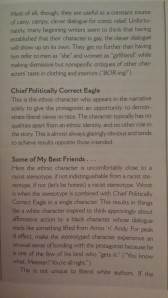Book by Howard Mittelmark and Sandra Newman.
NaNoWriMo is quickly approaching and I’ve been recounting the last year. November 2013 was my first NaNo, and as I’ve mentioned several times before, when I decided I was going to take my writing seriously. During the last eleven months, I’ve gone through many methods to improve my writing ability, and as I’m now a paid writer, I’d like to consider myself rather successful.
One of the first things I did once I made the decision was to scour the internet for a book that could help me improve my craft. There are tons of them, and though I’ve stopped looking, I’m sure plenty of new ones will continue to come out every year. It took me some time to make my decision, but in the end, I purchased the book How NOT to Write a Novel.
Truthfully, outside of actually sitting down and writing, I believe this book has helped me improve every aspect of my writing more than anything else I’ve ever read. Sure, I’ve read a large amount of writing tips online and have significantly increased my writing ability because of these, but almost everything that you will read online in regards to assisting you with writing a book is trying to tell you how to do it. How NOT to Write a Novel completely reverses this by telling you exactly what not to do. And for me, at least, I found this a very valuable resource.
This is what my copy of the book looks like:
Out of the 200 things you’re told not to do, there were 57!!! that I thought I ought to remember because they were mistakes I felt I would possibly make or were already making.
The following excerpt was one of my favourites and is one I believe I learnt the most from. It touches on something most people, I feel, aren’t quite sure how to handle. Lots of people want to cover the issue of race and/or politics in their books, but because of lack of experience in that regard, they end up creating something much worse than they would have if they ignored the issue altogether.
I feel that the subject of race is very important in literature, but today, I’m going to talk specifically about fantasy because that’s what I write; perhaps some day I will touch on the entire topic.
Many fantasy novels include different races. I’m not talking just about ethnicity (I will get to that in a bit), but rather entirely different races. You know, like the humanoid dragons in my novel Taichiren’s Heart, elves, or anything else that’s not labeled as a human. In real life, ethnicity is often what determines race, their traditions, their culture, their upbringing, and most importantly, how other characters feel and react around a character of a different race or culture. People who have been brought up in a different environment than person A won’t know or understand the environmental or cultural quirks that come along with being part of a different culture.
As I was a novice when I read this book, it didn’t quite hit me that it was something that can be and should be integrated into my stories. What kind of stigma do races have for each other? How do their cultures and societies vary? What happens if someone is dropped into a completely different culture? What are their thoughts, how do they react to their surroundings? How do they go about solving their predicament?
These, and more, are questions that can be asked in order to properly work in different races into a story. No culture is quite the same, no race is quite the same, no person is quite the same. This should be reflected in the story, and I feel it’s especially important to do so when you’re writing about completely different races that aren’t humans.
Though How NOT to Write a Novel only briefly touches on this subject, it was one that really opened my eyes to the depth inside stories. Not only do you have the background of your character to deal with, you have the background of their history, the stories and events that built who they are, where they came from, and how all of that shaped them and who they are. It shapes your story in a way that the plot doesn’t.
There are many things like this in How NOT to Write a Novel, all of which are immensely valuable for someone starting out or looking to improve. So if that’s exactly where you are, then I highly recommend picking up a copy of the book; maybe it’ll help me like it helped you.
Where have you gotten the best writing tips from? What is something that immensely improved how you write or how you looked at creating stories? Share them in the comments!
~Erynn



